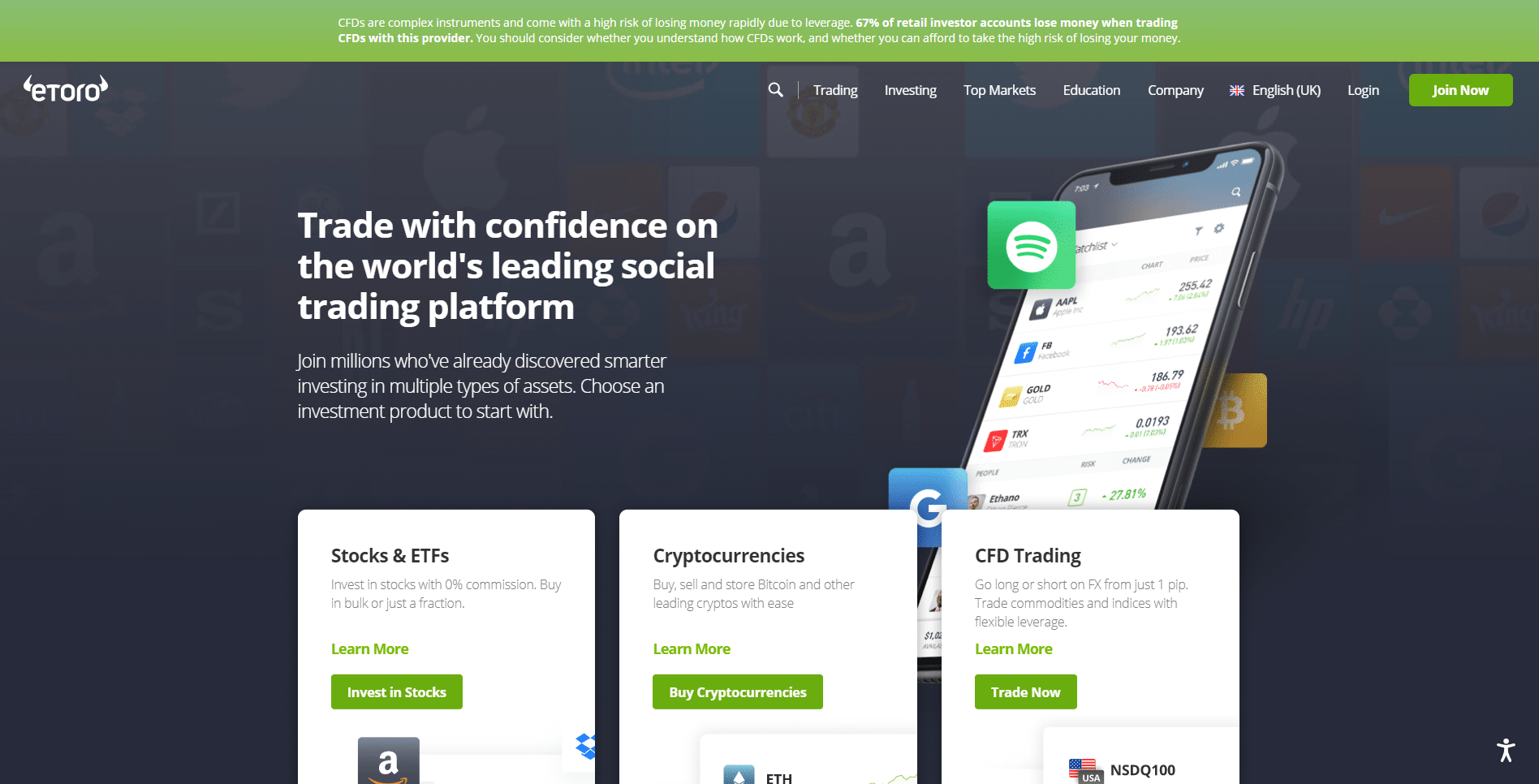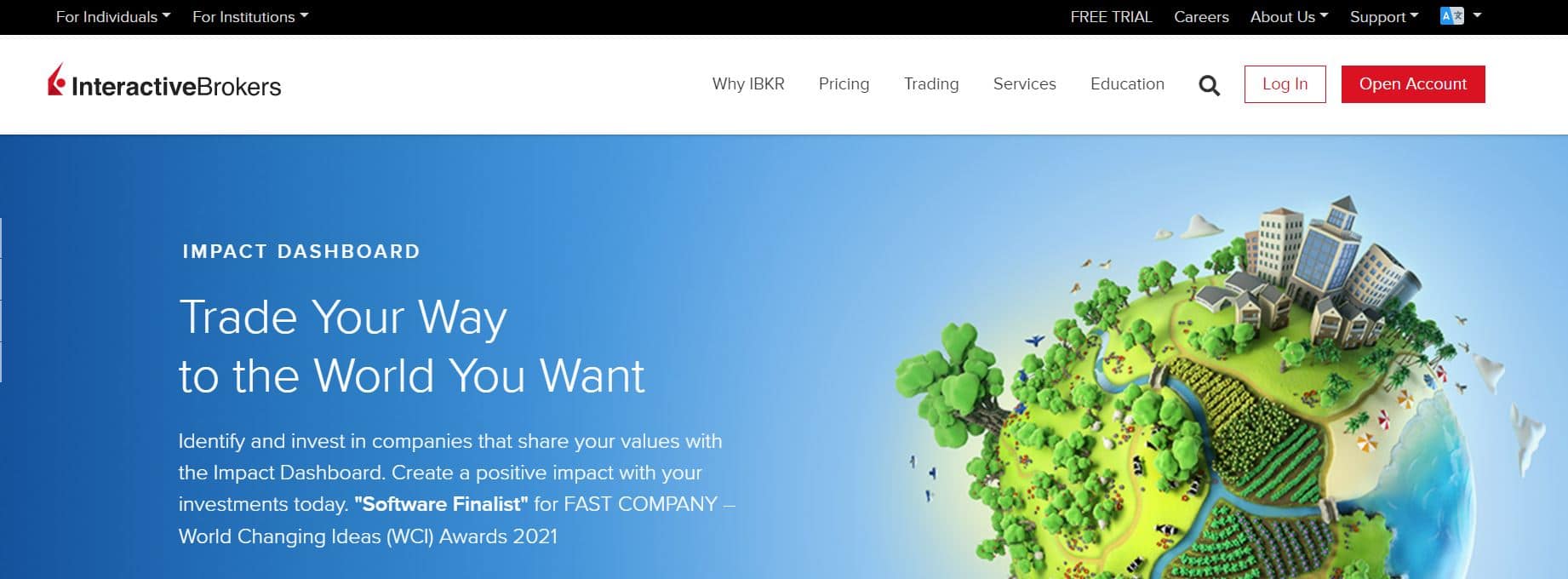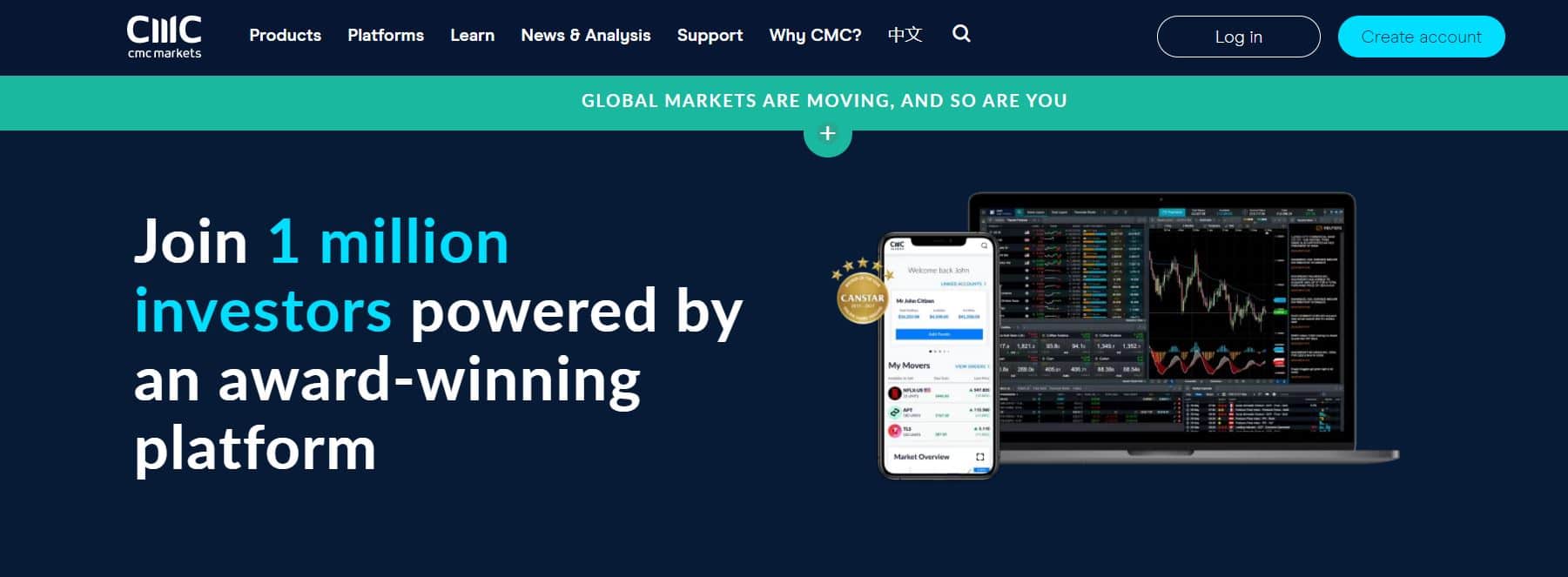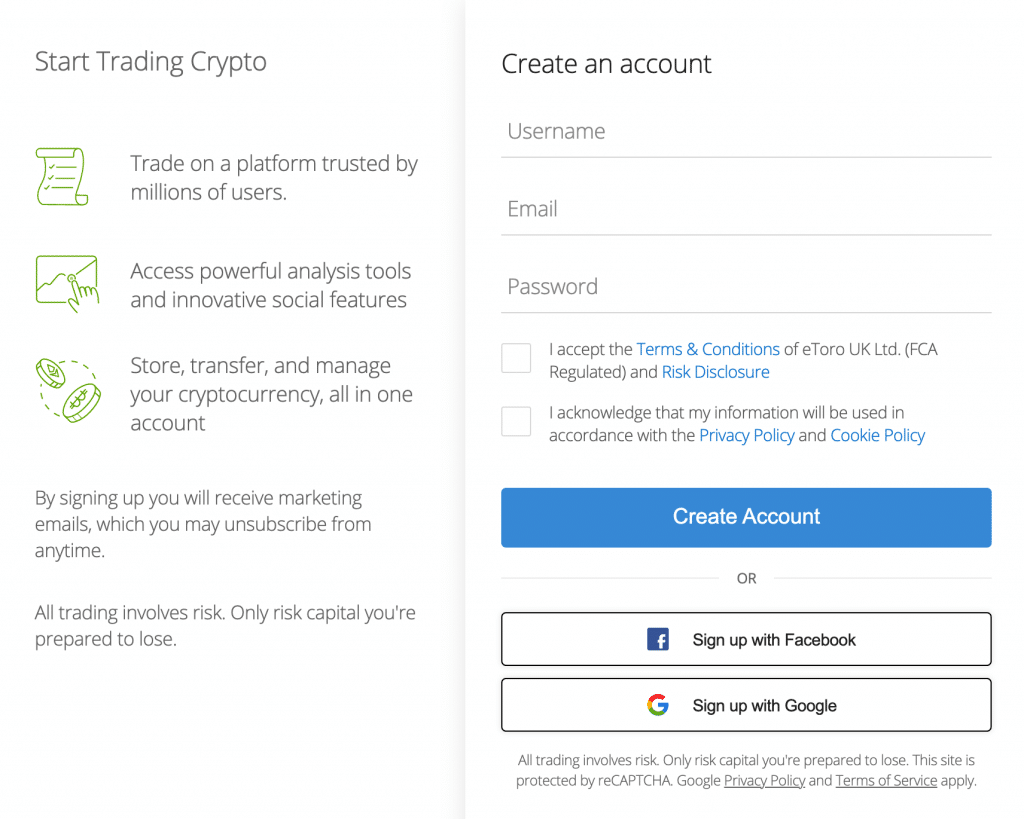ESG Investing Australia – ESG Investing Beginner’s Guide 2021
Please note that we are not authorised to provide any investment advice. The content on this page is for information purposes only.
Please note that we are not authorised to provide any investment advice. The content on this page is for information purposes only.
Social responsibility is no longer a trend – there is a real need for companies to switch to green energy, protect the environment, and source their materials responsibly. Many investors choose sustainable investing not only for the higher returns but also for knowing that their capital is invested in companies that make a positive difference in the world. Let’s find out what ESG investing is and how you can invest in sustainable assets.
Table of Contents
If you are already familiar with ESG investing, check out this quick guide on how to start ESG investing right now. Below, we will dive deeper into this topic and provide you with a well-rounded broker choice for ESG investing, what it means, and what its benefits and challenges are.
ESG investing refers to “environmental, social, and governance” investing. This category encompasses all the companies that are socially and environmentally responsible, including green energy stocks. They are often ranked by independent research companies, but not necessarily.
ESG investing has an obvious purpose: to direct investors’ capital towards companies that protect people, society, and the environment. In turn, this focus provides financial incentives to change to companies that currently have harmful policies. At the same time, sustainable companies enjoy more capital, which allows them to flourish.
Another reason that fuels the interest in ESG investing is the fact that ESG-focused investors are better at analysing risk and identifying growth opportunities. To have a better understanding, let’s discuss each component of environmental, social, and corporate governance.
Some investors check the company’s impact on the environment. For instance, sustainable companies have achieved or try to achieve net-zero carbon emissions, they do not use any toxic chemicals in their operations, and they have a sustainable supply chain (i.e., the company does not use unsustainable raw materials).
When analysing the social impact of a company, you need to check how the company culture affects the society at large, different communities, and its employees. Some aspects include hiring practices, diversity, LGBTQ+ equality, racial diversity, and inclusion programs. Also, some investors may prefer companies that are involved in charity programs, volunteer to help their local communities or have another way of supporting the society at large, well beyond its business activity.
We all know that leadership can make or break a company. Governance refers to how the company’s leaders drive change, what their initiatives are, and if there are any scandals or issues regarding management, such as executive pay, leadership diversity, and how leadership communicates with stakeholders.
In short, ESG investing refers to inspecting how a company treats and interacts with its employees, customers, shareholders, the environment, the society at large, and other stakeholders.
However, not all of these aspects carry the same value for all investors – for instance, you may believe that global warming is a more pressing issue than giving back to the local community, so you’d rather invest in a company with a net-zero emission strategy rather than one that volunteers to help the locals. So, how do we rank these companies according to ESG factors?
There are third-party research groups that rank companies, typically from 0 to 100. However, there is no central authority on ESG scores, which means that each research group uses a different methodology. Depending on the research provider, you may be able to identify what indicators they used, and some of the main ones include political contributions or climate change effects.
The way these companies collect these data is different, too. Some use company disclosures, others like the Dow Jones Sustainability index are created based on self-reported data. In other words, the company is contacted and required to complete a questionnaire – which can be more or less subjective.
As a result, there is no unequivocal way of identifying ESG companies. Some may prefer standard ESG ratings from research bodies, other investors prefer to do due their diligence through a DIY approach. For instance, you could read the annual reports of your chosen company and see what sustainability policies they have in place, how they make a difference, and whether they live up to your expectations.
Depending on your strategy, there are several online brokers to choose from. These are discussed below, along with the most important features, benefits, and drawbacks.

If you have at least US$50 saved for ESG investing, you can opt for a pioneer in copy trading: eToro. The broker allows you to invest in stocks, exchange-traded funds (ETFs), and many other assets. Unlike many other brokers on the market, eToro allows you to buy the real assets, not only trade CFDs (contracts-for-difference), which are simply agreements based on the price of the underlying asset.
Security & Privacy
Security and privacy are extremely robust when it comes to both the web platform and mobile app. Apart from being registered with the Australian Securities and Investments Commissions (ASIC), all data are encrypted, while the mobile app allows for biometric entry.
Fees & Features
eToro is a well-rounded broker ideal for all investing styles and preferences. Its versatile but user-friendly platform can be used to achieve your ESG investing objectives as it allows you to invest in real stocks and ETFs from a wide range of markets.
Although eToro does not have a stock filter for ESG or sustainable stocks, it has a more powerful tool to help you find worthwhile assets with minimum effort – the Popular Investment Program. eToro is well-known for its social trading features, and this program allows you to find investors who have the same interests as you: to invest ethically and pump money in companies that are good for the world, not only for your pocket.
Of course, you can also go for the traditional approach and start researching companies to invest in. Depending on your preference, you can sort stocks according to industries, or browse more than 250 ETFs. Some examples of popular stocks that belong to ethical sectors include Vestas Wind Systems (VWDRY), Vivint Solar (VSLR), and Waste Management (WM), among others. All real stocks and ETFs come with a $0 commission.
eToro Fees
| Fee Type | Fee Amount |
| Deposit Fee | $0 |
| Withdrawal Fee | $5 |
| Commission Fee | $0 |
| Inactivity Fee (charged monthly) | $10 |
Pros
Cons
67% of retail investor accounts lose money when trading CFDs with this provider.

Interactive Brokers took serious steps towards sustainable investing. The broker provides you with a broad array of ESG tools, making your research and investment quicker and more convenient.
Security & Privacy
Interactive Brokers are not only regulated by the ASIC, but also by the regulatory counterparts in the US, the UK, Hong Kong, Ireland, Canada, Central Europe, and others.
Fees & Features
Perhaps the most important feature is the “Impact Dashboard”. When you create your portfolio, you can switch between the performance and impact tabs of your investment. You can pick the most important values for you, such as consumer safety, ocean life, land health, gender equality, and others. Then, the broker displays how your investment aligns with your most important values.
Interactive Brokers also has a mobile app where you can monitor the ESG scores. For instance, if a company is downgraded, you will be alerted immediately on your phone, wherever you are. All Interactive Brokers platforms display ESG scores, so you can save significant time.
However, one of the main drawbacks is the complicated cost structure. You can choose from different payment plans – volume-based pricing or fixed-rate pricing. Fixed-rate pricing applies for all non-US stocks and exchange-traded funds and it is 0.08% of the trade value. Also, there is only one free withdrawal per month, and the subsequent ones are charged A$15 each.
Interactive Brokers Fees
| Fee Type | Fee Amount |
| Deposit Fee | $0 |
| Withdrawal Fee | $15 |
| Commission Fee | 0.08% |
| Inactivity Fee | $0 |
Pros
Cons
67% of retail investor accounts lose money when trading CFDs with this provider.

CMC Markets is a feature-rich broker that provides access to both real assets and derivatives (like CFDs and spread betting). The share trading platform comes for free or for $49 per month, depending on the functionalities and features you want.
Security & Privacy
CMC Markets is regulated through the ASIC and the FCA (Financial Conduct Authority in the United Kingdom). This ensures that your funds are safe while you are investing in assets via one of the largest brokers on the market.
Fees & Features
CMC Markets does not focus on ESG stocks – rather, you will have to do your due diligence and research the right assets for your portfolio. However, you do have access to news feed vendors – Dow Jones for the free plan and Reuters for the paid plan. You can also access Morningstar Quantitative Equity Research under the paid plan and Morningstar fundamental research for free.
However, while the broker provides plenty of research opportunities, the costs are considerably higher than eToro, for instance. If you trade US, UK, Canadian, or Japanese shares, the commission is $0. However, for other assets, you need to cover steep fees from $9.90 to $50, depending on your trade size if you are an active investor (11-30 trades per month or more than 5 trades and $500 in your account) or $11 or 0.10% for classic investors (for fewer trades per month). This complex cost structure makes it less affordable if you have a long-term approach or if you don’t plan to invest a large sum of money straight away.
CMC Markets Fees
| Fee Type | Fee Amount |
| Deposit Fee | $0 |
| Withdrawal Fee | $0 |
| Commission Fee | From $9.90 |
| Inactivity Fee | $10 |
Pros
Cons
67% of retail investor accounts lose money when trading CFDs with this provider.
To help you decide which broker is best for your needs, we put together this comparison table. As a long-term investor, inactivity fees and trading fees are extremely important, regardless of your capital. Thus, make sure you choose the best broker according to your style and objectives.
| Broker | Commission | Deposit Fee | Withdrawal Fee | Inactivity Fee |
| eToro | 0% | $0 | $5 | $10 |
| Interactive Brokers | 0.08% | $0 | $15 | $0 |
| CMC Markets | From $9.90 | $0 | $0 | $10 |
ESG investing usually refers to buying stocks or funds. Buying a stock means that you invest in a sustainable company, while funds can be either exchange-traded funds (ETFs) or mutual funds. These are baskets of stocks, and ethical ETFs or funds are collections of ethical companies. Let’s have a look at each of them.
Many active investors opt for stocks as the main asset type for their portfolios. Stocks are traded on stock exchanges, and online brokers like eToro allow you to buy and sell them with the click of a button. However, these can only be traded when the market is open, and trading hours depend on which exchange they are listed. One benefit of using eToro over other brokers is that you can place orders at any time and they will be conducted when the market opens, so you don’t need to be worried about time zone differences.
If you want to save more time, opting for exchange-traded funds is a cheap way to build a portfolio. These trade on the stock exchange and can be bought and sold just like shares – for any amount of money and at any time during the day.
In general, most ETFs are passively managed – this means that the fund composition does not change. Similar to stocks, you earn dividends if the stocks in the fund’s composition choose to pay them. Also, funds have a management fee, but this is lower in the case of passively managed ETFs. You can also find out more about clean energy ETFs.
Now that we presented what options you have, let’s see how to decide which assets are best for you.
If you are dedicated to building an ethical portfolio according to your preferences, investing in individual stocks may be the right choice. This way, you can decide which one of the ESG principles are most important to you and buy shares of companies whose financial performance is sound and follow sustainable practices. For instance, you may want to invest money in companies that try to limit their carbon footprint or those that generate energy using alternative resources.
The next option is to choose an ETF – this will also diversify your risk away since you will invest your money in several stocks at a time, rather than a few shares. There are numerous ETFs available focused on specific aspects. For instance, some may include green energy companies.
However, it is important to keep in mind that ETF’s composition is not managed by you – and details are often not transparent enough. You need to check the fund’s prospectus to find what companies it invests in, and its objectives. Also, these managers may not follow ESG principles to the core, since performance is often the key consideration when it comes to investments, so you need to do your due diligence to ensure that your portfolio is ethical.
Apart from knowing that you make a difference by supporting companies that protect the society, environment, and treat their stakeholders well, ESG investing has a few other benefits, as discussed below.
Environmental, social, and governance problems have bubbled up in recent years. Many companies made the headlines due to toxic corporate cultures, environmental disasters, and unfair employee treatment or wages, among others.
These issues are not likely to disappear soon. There are numerous ESG problems in Australia right now – from the ongoing global pandemic to wildfires and unethical corporate governance. Your money can both get you returns and help save the world, so why not invest in ESG-focused assets?
Also, the global market has been massively expanding. This translates to high returns for ESG-focused investors. One example is the Australian Ethical Investment fund manager – a company whose share price tripled in the past few years.
There are endless pieces of evidence that investors love ESG-focused investments, ranging from electric vehicle production companies to plant-based food companies. Their sky-rocketing share prices are not likely to stop any time soon as more and more people focus on sustainability.
However, just like any other investment, ESG-focused assets carry risk. Some of the main ones are discussed below.
ESG-focused assets are up to more scrutiny – from retail investors and media alike – than regular assets. Any small mistake is unlikely to go unnoticed, leading to overreacting. In other words, investors may rush to sell the assets on any bad news or slight corporate mistake, meaning that your portfolio value is going down. This drop may not be justified by other factors, such as the financial performance of the company.
At the same time, when the stock price decreases without good reason, the asset becomes undervalued (cheap). This would lead to non-ESG focused investors rushing to buy the cheap asset, bumping the prices back up. These swings lead to higher volatility, which means that it is more difficult to find assets worthy of your attention that meet your risk preferences.
In short, there is no clear definition of what ESG investing really means – it may be investing in green energy companies, or it may simply mean to you that you need to avoid companies with toxic company culture.
There are some definite no-no areas in ESG – such as the tobacco industry, for instance. However, this becomes even more difficult if you opt for ETFs, as you need to check the prospectus periodically and verify whether you agree with their rules and chosen assets.
Now that you are better equipped to start ESG investing, we will walk you through the process of creating an investment account. For this, we will use our most recommended broker for ESG investing – eToro.
Visit eToro’s website and complete the registration form. Here, you will create an account using your preferred username that will appear on the platform, and your name, email address, and password.

The second step is to verify your identity. eToro is a regulated broker which needs to comply with the Know Your Customer policy. Thus, you need to upload your government-issued ID and proof of address. This process is the same, regardless of your chosen broker, as long as they are regulated and safe.

Now, you are ready to deposit your funds. Choose your preferred payment method and select the amount of your starting capital. eToro has several instant payment methods, including PayPal and credit or debit cards.
With your new account balance, you have everything you need to start ESG investing. Make sure you do your diligence to screen all the possible assets and find the best ones according to your sustainable principles, ethical values and, also, your return and risk expectations.
ESG investing is quite a subjective topic – it is up to you what assets you consider ethical. No matter what your investing purpose is, ethical decisions lead the way for many investors. This also means higher returns for those willing to bet on new, high-tech companies that invest in green energy, electric vehicles, and other emergent markets.
If you haven’t decided which broker is best for you, we recommend trying eToro’s demo account – you will get hands-on experience with all of its features without risking your money. You can trade with live prices, use all the tools that you will have in your real account, so you can get familiar with the platform. Once you get familiar with it, you can deposit your capital and start ESG investing.